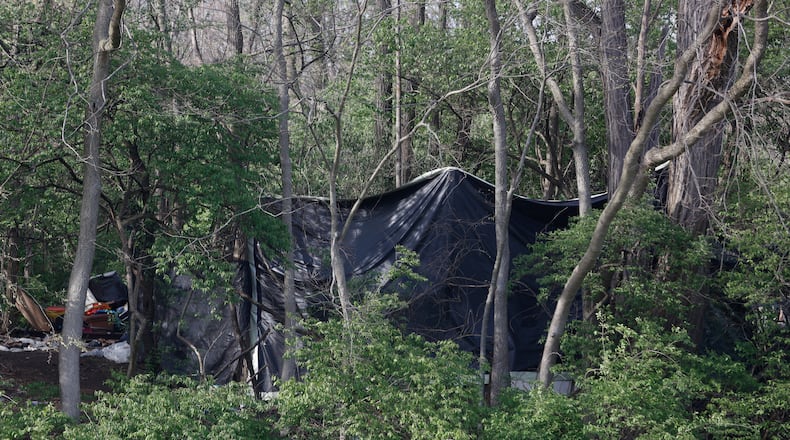“After assessing the situation, there were some health and safety concerns there; just having people actively living in our parks poses significant risks not just to the individuals living there but also to the community as a whole,” Logan Cobbs, the city’s community development director, said. “So our goal is not just to kind of clear that space but also to offer pathways to shelter and housing and support.”
Cobbs said the lack of restroom facilities has created sanitary concerns.
The city, along with Sheltered Inc. representatives and case managers, went tent-to-tent on April 4 to inform people the encampment would be cleared, Cobbs said. Letters were left for people not there at the time.
“We definitely wanted to make sure that we were being compassionate and prioritizing care there because a lot of people for the last couple of months have been calling Snyder Park home,” Cobbs said. “So we wanted to make sure we were doing our due diligence and treating people with dignity.”
Nonprofits and the city conduct point-in-time counts to determine how many unsheltered and sheltered people experiencing homelessness exist at a given time in January. A 2023 count found 152 people sheltered and 10 unsheltered. The number grew in 2024 to 204 sheltered and 20 unsheltered.
This year’s point-in-time count, which has not yet been verified by the Coalition on Homelessness and Housing in Ohio, found 97 sheltered and 10 unsheltered. Cobbs attributed the decrease to the shutting down of the Executive Inn last summer.
Sheltered Inc. has capacity at both of its shelters, and the city in March awarded the nonprofit up to $302,784 to increase services. This includes reopening both shelters to 24 hours daily.
Springfield’s only non-congregate shelter closed in August after the city, in a split vote, rejected a proposal for Dayton-based homelessness nonprofit Homefull to operate the Executive Inn site.
The resolution that commission rejected would have approved up to $1.04 million in federal funds to Homefull for one year for services performed, with the option to renew for three more one-year periods.
Springfield is a HUD entitlement community, finance director Katie Eviston said previously, meaning that it is eligible for Community Development Block Grants to help “develop viable urban communities by providing decent housing and a suitable living environment,” according to the federal Department of Housing and Urban Development.
In August, Clark County filed a civil lawsuit against Sheltered Inc. for breach of contract and is seeking reimbursement of more than $500,000. This lawsuit stems from a county allegation that the nonprofit mismanaged funds for Temporary Assistance for Needy Families (TANF) or Prevention, Retention and Contingency (PRC) services, which provide work support and other services to low-income families.
The county pulled funds after the allegations, and the city followed suit.
Sheltered Inc. has said it is working with the county “to resolve our differences.”
A jury trial in the case is scheduled for next year.
Cobbs said it is important to address the causes of homelessness, including housing costs and availability, untreated mental illness, addiction and system discharge without support, like from foster care or the justice system.
The city has not yet seen a direct impact on homelessness services from federal funding cuts, but it is planning for the possibility, along with other impacts.
The community did see an impact to resources often used by people experiencing poverty with the cancellation of a more than $200,000 recent federal food shipment to Second Harvest Food Bank of Clark, Champaign & Logan Counties last month.
Project Woman’s shelters have been at capacity for some time, and the nonprofit recently opened another shelter in Urbana. Cobbs said the city is working with the nonprofit to increase capacity in Springfield.
Cobbs said homelessness is a concern across the nation.
“Addressing the issues is going to require continued investment and innovation, but also strong collaboration across all sectors,” Cobbs said. “This is not a government issue. This is not a nonprofit issue. This is not going to be solved by the private sector. This is something the community as a whole will really have to rally around.”
About the Author

